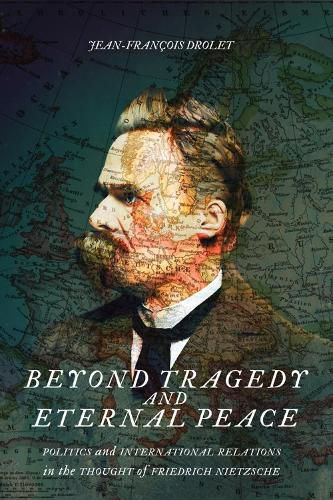Readings Newsletter
Become a Readings Member to make your shopping experience even easier.
Sign in or sign up for free!
You’re not far away from qualifying for FREE standard shipping within Australia
You’ve qualified for FREE standard shipping within Australia
The cart is loading…






This title is printed to order. This book may have been self-published. If so, we cannot guarantee the quality of the content. In the main most books will have gone through the editing process however some may not. We therefore suggest that you be aware of this before ordering this book. If in doubt check either the author or publisher’s details as we are unable to accept any returns unless they are faulty. Please contact us if you have any questions.
As a German philosopher, cultural critic, composer, poet, philologist, and scholar of Latin and Greek, Friedrich Wilhelm Nietzsche has exerted a profound influence on modern intellectual history. Beyond Tragedy and Eternal Peace provides an overview of his legacy, highlighting the synergy between his critique of metaphysics and his reflections on the politics and international relations of the late nineteenth century.
Jean-Francois Drolet exposes and analyzes Nietzsche’s account of the political processes, institutions, and dominant ideologies shaping public life in Germany and Europe during the 1870s and 1880s. Nietzsche anticipated a new kind of politics, borne out of such events as the Franco-Prussian War, the unification of Germany under Bismarck, the advent of mass democracy, and the rise and transformation of European nationalism. Focusing on conflict and political violence, Drolet expertly reconstructs Nietzsche’s fierce and continued critique of the nationalist, liberal, and socialist ideologies of his age, which the philosopher believed failed to grapple with the death of God and the crisis of European nihilism it engendered.
As this reconstructive interpretation reveals, Nietzsche’s philosophy offers a powerful and still greatly underappreciated reckoning with the changing political practices, norms, and agencies that led to the momentous collapse of the European society of states during the early twentieth century.
$9.00 standard shipping within Australia
FREE standard shipping within Australia for orders over $100.00
Express & International shipping calculated at checkout
This title is printed to order. This book may have been self-published. If so, we cannot guarantee the quality of the content. In the main most books will have gone through the editing process however some may not. We therefore suggest that you be aware of this before ordering this book. If in doubt check either the author or publisher’s details as we are unable to accept any returns unless they are faulty. Please contact us if you have any questions.
As a German philosopher, cultural critic, composer, poet, philologist, and scholar of Latin and Greek, Friedrich Wilhelm Nietzsche has exerted a profound influence on modern intellectual history. Beyond Tragedy and Eternal Peace provides an overview of his legacy, highlighting the synergy between his critique of metaphysics and his reflections on the politics and international relations of the late nineteenth century.
Jean-Francois Drolet exposes and analyzes Nietzsche’s account of the political processes, institutions, and dominant ideologies shaping public life in Germany and Europe during the 1870s and 1880s. Nietzsche anticipated a new kind of politics, borne out of such events as the Franco-Prussian War, the unification of Germany under Bismarck, the advent of mass democracy, and the rise and transformation of European nationalism. Focusing on conflict and political violence, Drolet expertly reconstructs Nietzsche’s fierce and continued critique of the nationalist, liberal, and socialist ideologies of his age, which the philosopher believed failed to grapple with the death of God and the crisis of European nihilism it engendered.
As this reconstructive interpretation reveals, Nietzsche’s philosophy offers a powerful and still greatly underappreciated reckoning with the changing political practices, norms, and agencies that led to the momentous collapse of the European society of states during the early twentieth century.